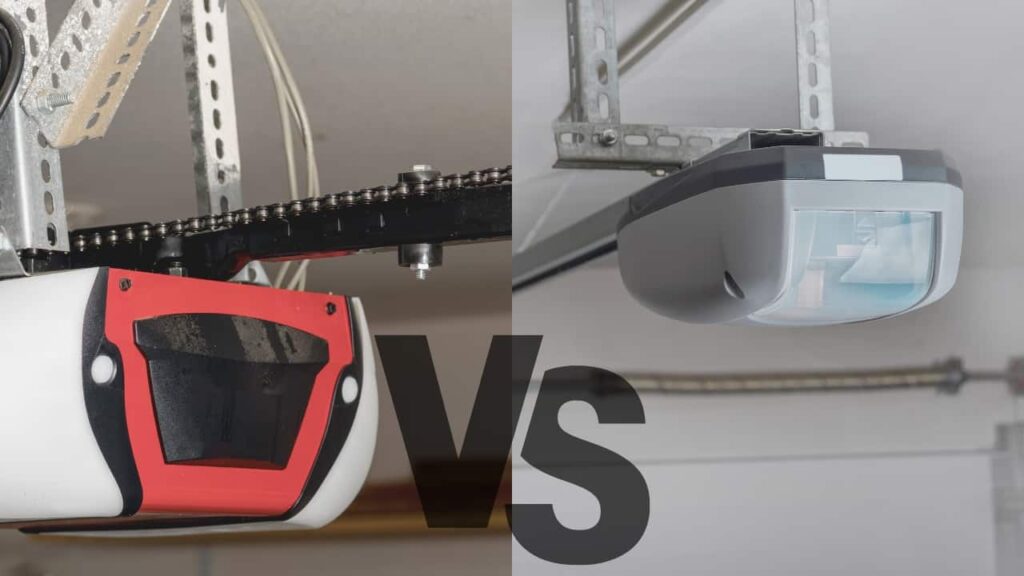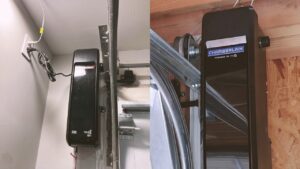When it comes to buying a new garage door opener, many homeowners find themselves weighing the pros and cons of belt vs chain garage door opener. But, while both types of openers serve the same basic function, there are some key differences between the two that you should carefully consider.
Chain-drive garage door openers use a metal chain, while belt-drive garage door openers use a rubber belt to lift the garage door.
Chain-drive systems are generally cheaper, more durable, and more powerful. However, they are significantly louder than the belt-type system.
Belt-drive units are more expensive but are much quieter, more reliable, and longer-lasting.
Are you still confused? Read on to learn more!
Belt vs Chain Garage Door Opener Which is Better?
Both chain-drive and belt-drive garage door openers have their own set of advantages and disadvantages. It’s ultimately a matter of personal preference and what works best for your specific needs.
To make an informed decision, gaining an understanding of garage opener mechanics is crucial, as it helps in evaluating the differences between these systems.
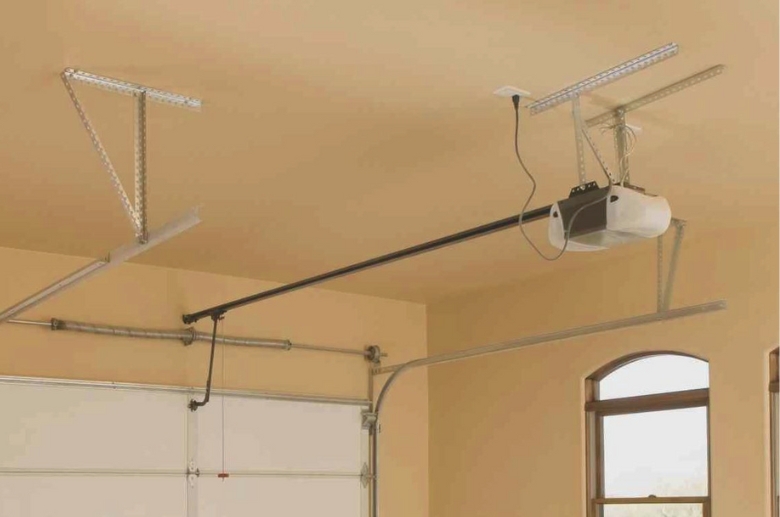
The belt-drive garage door opener is considered superior to a chain-drive system because:
- It is much quieter than chain-drive systems – With a rubber belt instead of a metal chain, the opener reduces the amount of noise that is produced during operation. This can be especially important if the garage is located near a bedroom or other living space.
- It requires less maintenance – They don’t require frequent lubrication. Because they have fewer moving parts, they are less susceptible to misalignment and jamming.
- It is reliable and cost-effective – While belt-drive systems may be more expensive upfront, they can be a worthy investment due to their performance and reliability. On the other hand, we recommend the chain-drive if you have budget limitations and use your garage more frequently.
- Chain-drive garage door openers are less expensive – Since it’s one of the oldest types out there, it’s pretty low-cost compared to the belt-drive.
- It is sturdy and strong if maintained properly – A chain-drive system is less prone to breaking down because of its sturdy metal components. It is also recommended for frequently used doors that are more than 400 pounds.
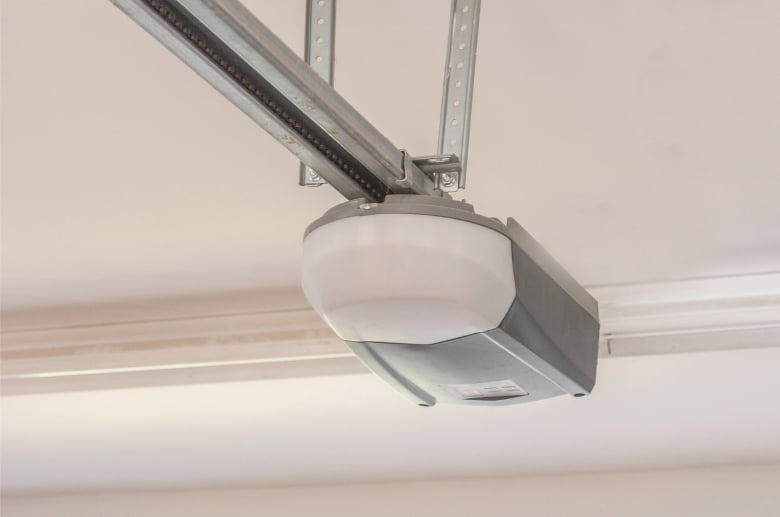
- It requires regular lubrication – Chain-drive systems may require more repairs over time if not properly maintained or lubricated, which can add to the overall cost of ownership. But then again, determining the best option will depend on several combinations of factors, including your budget, time, door weight, frequency of use, location of your garage, convenience that you need, etc.
So, it’s important to consider different factors before making a decision. Here’s a table of factors comparing chain-drive vs. belt-drive garage door openers to help you in your selection process:
| FACTOR | CHAIN-DRIVE | BELT-DRIVE |
| Cost | Average Unit Cost: $150 to $250Average Installation Cost: $150 to $300 | Average Unit Cost: $200 to $250Average Installation Cost: $150 to $300 |
| Maintenance | Requires regular lubrication | Requires less upkeep |
| Durability | A metal chain is more durable | The belt is prone to wear and tear |
| Strength | Has ½ to ¾ Horsepower | Has ½ to ¾ Horsepower |
| Sound | Produces 70 to 80 decibels | Produces 50 decibels or less |
| Speed | 7 inches per second | 8 inches per second |
| Lifespan | 10 to 15 years | 15 to 20 years |
| Smart Features | Can be integrated with smart features | Can be integrated with smart features |
Backup Battery | Usually comes with a lead-acid backup battery with shorter lifespan | Usually comes with a lithium-ion backup battery with longer lifespan |
1. Cost
Chain-drive garage door openers are less expensive than belt-drive models. A unit usually costs around $150 to $250.
For professional installation, you’re looking at around $150 to $300 in expenses. Belt-drive garage door openers are a bit more expensive, and a unit costs around $200 to $250 with the same installation cost as the chain-drive system.
NOTE: It’s important to keep in mind that the initial purchase price is not the only cost to consider. Belt-drive garage door openers require less maintenance over time, which can save you money in the long run.
2. Maintenance
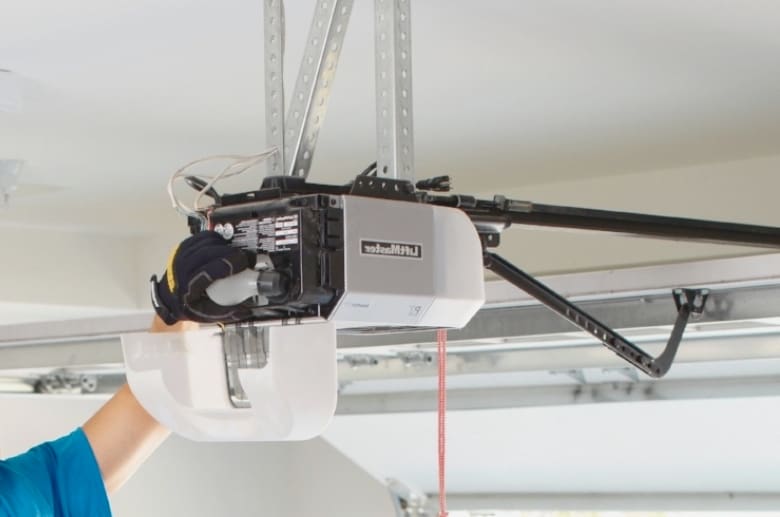
Both chain-drive and belt-drive garage door openers require some level of maintenance to keep them running smoothly. However, belt-drive models tend to require less maintenance because they have fewer moving parts and are less susceptible to wear and tear.
On the other hand, chain-drive openers may require more frequent maintenance as the chain must be sufficiently lubricated to keep it in good condition.
Garage Insider Tip: The sprocket of a chain-drive system could become misaligned over time, which could jam the garage door. So, you should regularly inspect the roller brackets and tracks for signs of wear and make sure they are properly aligned for smooth operation.
Connect With A Garage Expert
Connect with local experts, Compare quotes, Get the best price.
3. Durability
Chain-drive systems are generally more durable than belt-drive systems, especially in high-stress applications. The metal chain is the key component that makes chain-drive openers more durable.
On the other hand, belts are made of rubber and can stretch or wear out over time. However, some belts, such as composite belts made from fiberglass, kevlar, carbon fiber, and steel-reinforced polyurethane, are designed to be more resistant to wear and stretching.
4. Power or Strength
If you have a heavy garage door, like a wood garage door or a fully insulated steel garage door, you’ll need a chain-drive garage door opener with a high weight lifting capacity.
Chain-drive garage door openers have a horsepower rating of around 1/2 to 3/4 horsepower (hp), which is already sufficient to lift the door of a 2-car garage. For heavier doors around 400 pounds, heavy-duty models with at least 1 horsepower are recommended.
Generally, belt drives also have 1/2 to 3/4 horsepower to support double garage doors. However, it’s not recommended to use belt-drive door openers for frequent operations.
Depending on the model and specifications, both chain-drive and belt-drive garage door openers have a variety of weight lifting capacities. Their strength will depend on various factors, such as the size and quality of the components, the type of material used, and the operating environment.
5. Sound
The belt-drive system is generally quieter, and the rubber belt reduces the amount of noise that is produced during operation. In addition, it reduces opening and closing noise by 20%–35% compared to a chain-drive opener.
While there are no clear baselines to determine the amount of noise each unit produces, most manufacturers claim that a belt-drive system produces around 40 to 50 decibels of sound. In contrast, chain-drive openers produce around 70 to 80 decibels, depending on their lubrication.
In addition to being quieter, belt-drive garage door openers also tend to produce less vibration than chain-drive openers. This can be especially beneficial if you have sensitive items stored in the garage that vibrations could affect you.
6. Speed
Both chain-drive and belt-drive garage door openers are available at a range of speeds. Belt-drive models tend to be faster than chain-drive models because they have fewer moving parts. On average, belt-drive garage door openers can open and close a garage door at speeds of up to 8 inches per second. This is faster than a chain-drive garage door opener’s average speed, typically around 7 inches per second.
However, it’s important to note that the speed of a belt-drive opener can vary depending on the size and weight of the garage door, as well as the specific model of the opener. Some belt-drive openers may be able to open and close a door at even faster speeds, while others may be slower depending on their design and capabilities.
7. Lifespan
On average, garage door openers can last for 10 years or more. However, belt-drive openers are known to last up to 20 years, while chain-drive openers tend to have a lifespan of around 15 years. A unit’s lifespan has a lot to do with maintenance and its moving components.
Therefore, the life expectancy of a chain-drive garage door opener tends to be shorter because of its maintenance requirements and its moving parts. Belt-drive systems require less maintenance than chain-drive models, which is a big factor contributing to each unit’s overall lifespan.
On the other hand, units from well-known brands, like Liftmaster, Chamberlain, or Genie, tend to be more durable because of their proven track record of providing high-quality products.
Remember: The cheaper ones may not be as reliable as the more expensive ones.
8. Smart Features
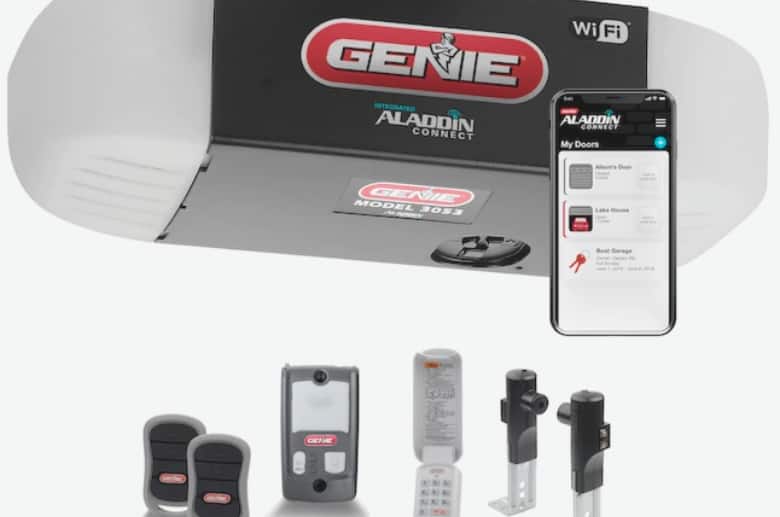
Both belt-drive and chain-drive garage door openers can be equipped with a variety of smart features, including:
- Remote Access: This allows you to control your garage door from anywhere using a smartphone app or smart home hub.
- Voice Control: With a smart speaker or virtual assistant, you can use voice commands to open and close your garage door.
- Automatic Close: This feature will close your garage door after a set period if left open.
- Alerts and Notifications: You can receive alerts on your smartphone when your garage door is opened or closed or if there is an issue with the opener.
- Security Features: Some garage door openers come with security features such as encrypted signals and secure authentication to prevent unauthorized access.
- WiFi and App Control: This feature allows you to use your smartphone to control your garage door opener, set schedules, create custom notifications, and grant temporary access to others. LiftMaster’s MyQ and Genie’s Aladdin are some examples that have this feature.
9. Backup Battery
A backup battery is a secondary power source that can be used in the event of a power outage. This is especially useful in areas prone to storms or other natural disasters, as it ensures that you can still access your garage if the power goes out.
Many belt-drive garage door openers offer a backup lithium-ion battery as an optional feature. These batteries are known for their long lifespan and low self-discharge rate, meaning they will hold a charge for a longer period of time without needing to be replaced as often.
On the other hand, chain-drive garage door openers usually offer a lead-acid backup battery. These batteries are cheaper to produce but have a shorter lifespan and a higher self-discharge rate than lithium-ion batteries.
Connect With A Garage Expert
Connect with local experts, Compare quotes, Get the best price.
Chain Vs Belt Garage Door Opener: The Winner
In conclusion, both chain drive and belt drive garage door openers have their own unique set of benefits and drawbacks. While chain drive systems are generally more affordable, they can be louder and require more maintenance. On the other hand, belt-drive systems are generally quieter and require less maintenance, but they tend to be more expensive.
Ultimately, the choice between a chain-drive and belt-drive system should be based on your specific needs and budget, as well as the size and weight of your garage door.
Our recommendation is the following:
Choose the Belt-Drive Garage Door Opener if:
- your garage is attached or near your living space
- you have enough budget
- you want a quieter option
Choose the Chain Garage Door Opener if:
- you want a budget-friendly unit
- you frequently use your garage
- your door weighs over 400 to 500 pounds
If you’re ready to make your choice, please give us a call or request a quote so that we can assist you further and connect you to our network of professional installers.

